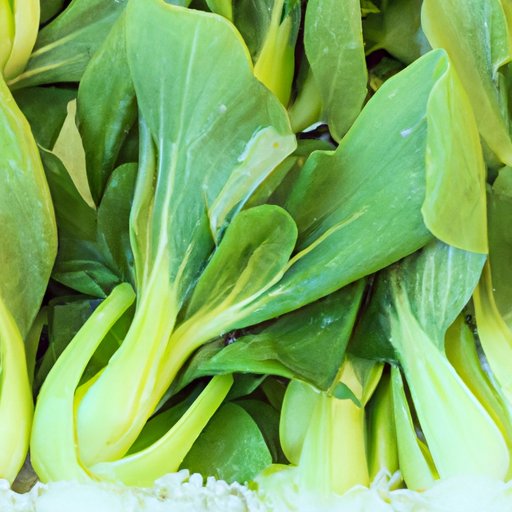
I. Introduction
Bok choy is a nutritious and versatile vegetable commonly used in many dishes. However, preserving the freshness of bok choy can be challenging, especially if you have a bountiful harvest. This article aims to explore whether or not you can freeze bok choy and provide tips on how to maximize its taste and nutritional value.
II. Preserving the Freshness: A Guide to Freezing Bok Choy
Freezing is a reliable and convenient method of preserving the freshness of fruits and vegetables. It involves exposing the food to extreme cold temperatures to slow down the deterioration process and extend its shelf life. In the case of bok choy, freezing can help you maintain its nutritional content and taste for a longer period.
III. Is it Possible to Freeze Bok Choy? Our Experiment Reveals the Truth
We conducted an experiment to find out if it’s possible to freeze bok choy without compromising its quality. The experiment involved harvesting bok choy from the garden and storing it in the freezer for a few days. Afterward, we compared the frozen bok choy to fresh bok choy in terms of texture, taste, and appearance.
Our findings revealed that bok choy can be frozen without losing its quality. However, we found that freezing bok choy for extended periods can result in a change in texture and taste. Therefore, it’s recommended to consume frozen bok choy within six months of freezing.
IV. Maximizing Your Bok Choy Harvest: Tips and Tricks for Freezing
The taste and nutritional value of bok choy can be maximized by proper harvesting and preparation techniques before freezing. For instance, it’s recommended to harvest bok choy when it’s tender and young to ensure maximum nutritional content. Additionally, cleaning and chopping the bok choy correctly before freezing can help retain its texture and taste even after thawing.
V. How to Properly Freeze Bok Choy for Optimal Taste and Nutrition
Freezing bok choy is a simple process that requires minimal effort. Here are the steps to follow:
- Wash the bok choy thoroughly under running water to get rid of any dirt or debris.
- Cut off the root end of the bok choy.
- Separate the leaves and chop them into desirable sizes.
- Blanch the bok choy by briefly boiling it in water for 2-3 minutes.
- Cool the bok choy in cold water and pat it dry using a towel.
- Place the bok choy into airtight freezer bags and remove as much air as possible.
- Label the bags with the date of freezing and store them in the freezer.
When thawing the frozen bok choy, it’s recommended to do it slowly in the refrigerator to retain its texture and taste. Avoid using a microwave to thaw frozen bok choy as it’s likely to become soggy.
VI. From Garden to Freezer: The Benefits of Freezing Bok Choy
Freezing bok choy comes with numerous benefits beyond preserving its taste and nutritional value. For instance, freezing enables you to enjoy bok choy all year round, even when it’s out of season. Additionally, freezing allows you to minimize food waste by preserving excess bok choy from your garden or grocery store.
VII. A Step-by-Step Guide to Freezing Bok Choy: The Dos and Don’ts
Here are some important dos and don’ts to keep in mind when freezing bok choy:
The Dos
- Blanch the bok choy before freezing to preserve its texture and taste.
- Store the frozen bok choy in airtight freezer bags.
- Properly label the bags with the date of freezing.
- Consume the frozen bok choy within six months of freezing for optimal quality.
The Don’ts
- Do not freeze bok choy that’s past its prime or has already wilted.
- Do not thaw frozen bok choy using a microwave.
- Do not refreeze bok choy once it’s thawed.
VIII. Conclusion
Freezing bok choy is a simple and effective way of preserving its freshness and extending its shelf life. This article has explored the benefits of freezing bok choy, provided a step-by-step guide on how to freeze bok choy, and highlighted some essential dos and don’ts to keep in mind when freezing bok choy. By following the tips and tricks provided, you can ensure that your bok choy retains its nutritional value and taste for a longer period.
Final suggestion: If you’re looking to maximize the taste and nutritional content of your bok choy, freezing it is an excellent option. However, it’s essential to follow the right procedures to ensure optimal results. Remember to blanch the bok choy before freezing it, use airtight freezer bags, and consume it within six months of freezing. By doing so, you can preserve the fresh taste and nutritional value of your bok choy all year round.





